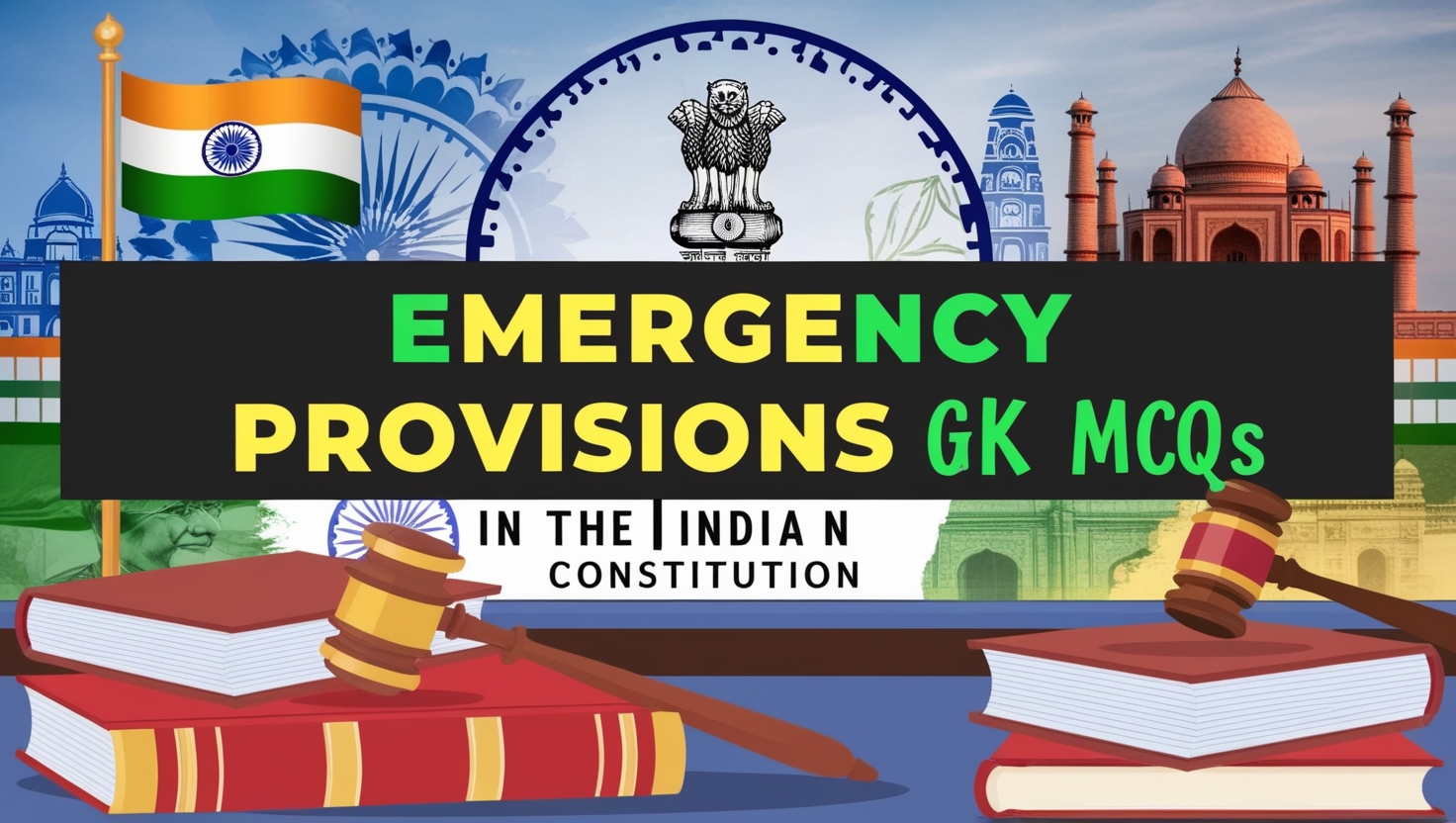
The Emergency Provisions GK MCQs cover important aspects of the Indian Constitution’s emergency provisions, which grant the government special powers during critical situations. This article provides multiple-choice questions (MCQs) designed to help students and competitive exam aspirants understand the types, conditions, and impacts of these provisions.
These questions focus on national emergency, state emergency, and financial emergency, offering a comprehensive review for mastering this crucial topic.
1. Which Articles of the Indian Constitution contain the Emergency Provisions?
- Articles 350 to 360
- Articles 352 to 360
- Articles 342 to 350
- Articles 362 to 370
Show Answer
Answer: Articles 352 to 360
The Emergency Provisions are contained in Part XVIII of the Constitution of India, specifically in Articles 352 to 360. These provisions empower the Central government to deal with any abnormal situation effectively.
2. Which Article of the Indian Constitution contains the provisions of National Emergency?
- Article 352
- Article 356
- Article 360
- Article 362
Show Answer
Answer: Article 352
Article 352 of the Indian Constitution deals with the provisions for National Emergency. It empowers the President to declare a National Emergency in case of war, external aggression, or armed rebellion. This type of emergency is also known as “National Emergency.” The President can declare a National Emergency when the security of India or any part of it is threatened by these specific situations. The grounds for declaring a National Emergency are external aggression, internal disturbances, and armed rebellion, but communal riots are not specifically mentioned as grounds for such a declaration.
3. Who is empowered to declare National Emergency under Article 352?
- The Parliament
- The Prime Minister
- The Council of Ministers
- The President
Show Answer
Answer: The President
The original Constitution included “internal disturbance” as one of the grounds for the proclamation of a National Emergency. However, the 44th Amendment Act of 1978 replaced “internal disturbance” with “armed rebellion.”
4. Which of the following are the grounds on which National Emergency can be declared?
- External aggression
- Internal disturbances
- Armed rebellion
- All of the above
Show Answer
Answer: All of the above
The grounds on which National Emergency can be declared are external aggression, internal disturbances, and armed rebellion.
5. On which basis can the President not declare a National Emergency?
- War
- External attack
- Threat to internal peace
- Armed Rebellion
Show Answer
Answer: Threat to internal peace
The original Constitution mentioned “internal disturbance” as one of the grounds for the proclamation of a National Emergency. However, the 44th Amendment Act of 1978 replaced “internal disturbance” with “armed rebellion.”
6. The President can suspend enforcement of Fundamental Rights under which of the following Articles?
- Article 13
- Article 359
- Article 358
- Article 356
Show Answer
Answer: Article 359
During a National Emergency, Article 359 of the Indian Constitution allows the suspension of the right to move any court for the enforcement of Fundamental Rights, but the Fundamental Rights themselves are not suspended. However, the rights guaranteed by Articles 20 to 21, which relate to protection in respect of conviction for offences and the right to life and personal liberty, cannot be suspended and remain enforceable even during an emergency.
7. Which of the following Articles cannot be suspended by the President under Article 359 of the Indian Constitution?
- Articles 16 and 17
- Article 17 and 18
- Articles 19 and 20
- Articles 20 and 21
Show Answer
Answer: Articles 20 and 21
The right to move the Court for the enforcement of Fundamental Rights guaranteed by Articles 20 to 21 cannot be suspended. The right to protection in respect of conviction for offences (Article 20) and the right to life and personal liberty (Article 21) remain enforceable even during an emergency.
8. Under which Article are the six Fundamental Rights under Article 19 automatically suspended during National Emergency?
- Article 356
- Article 357
- Article 358
- Article 359
Show Answer
Answer: Article 358
When a proclamation of a National Emergency is made, the six Fundamental Rights under Article 19 are automatically suspended, according to Article 358. The President is not required to issue any separate order for their suspension.
9. Which of the following are affected due to National Emergency?
- Centre-state relations
- Life of the Lok Sabha and State assembly
- Fundamental Rights
- All of the above
Show Answer
Answer: All of the above
A proclamation of National Emergency leads to drastic and wide-ranging effects on the political system of the country. It affects Centre-state relations, the life of the Lok Sabha and State assembly, and the Fundamental Rights.
10. Which of the following statements is incorrect with respect to National Emergency?
1. A resolution for disapproval is required to be passed by both the Houses of Parliament.
2. Resolution for disapproval is to be adopted by a simple majority only.
Choose the correct option:
- Only 1
- Only 2
- Both 1 and 2
- None
Show Answer
Answer: Only 2
A resolution for the proclamation of an emergency or its continuation must be passed by either House of Parliament by a special majority. The resolution for disapproval is required to be passed by the Lok Sabha only, while for continuation, it needs to be passed by both Houses of Parliament. Additionally, for disapproval, it must be adopted by a special majority, not a simple majority.








Leave a Reply